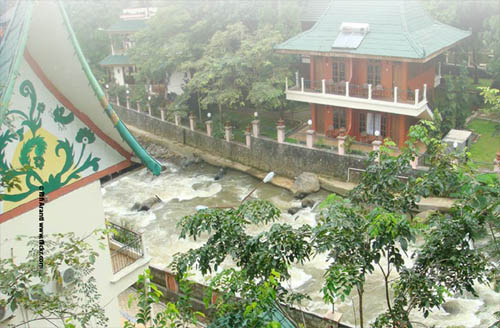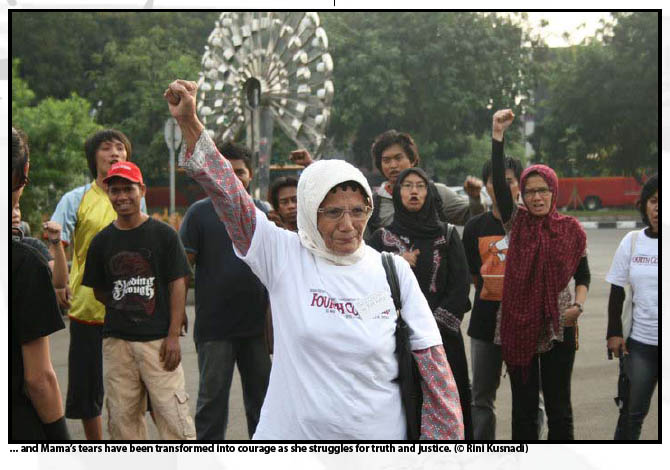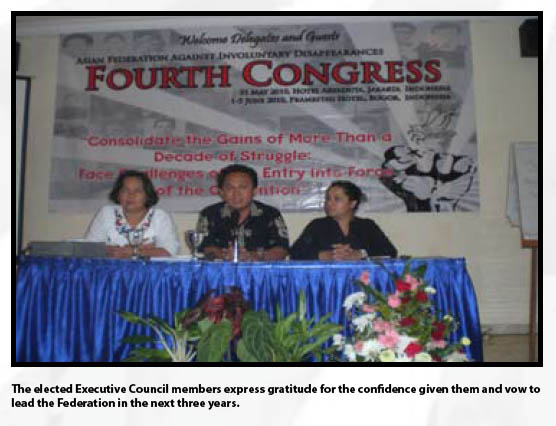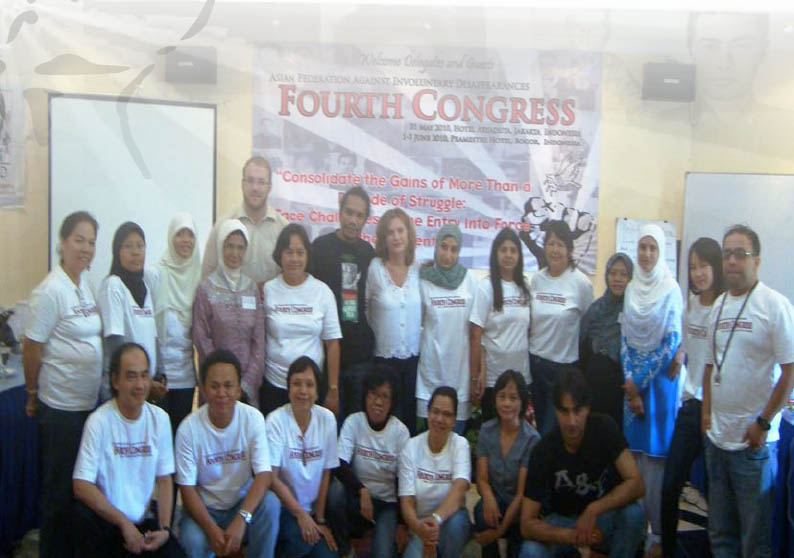Bogor, Bond and Basho Memoirs of AFAD Fourth Congress
by Dhiraj Kumar Pokhrel

The Arrival
Beads of sweat streamed down my temples as we came out of Soekarno-Hatta
International Airport, Tangerang, Indonesia. We saw a lean figure with a
placard held high written “Mrs. Dhiraj Pokhrel” in bold letters.
My friend chuckled with her usual grin. I felt a little embarrassed.
To her horror and my utmost pleasure, another placard surfaced out of
the crowd reading “Mr. ... “.
Relieved, I, with a reflexive smirk, tried to read her reaction.
Boomeranged, she answered back with a frown.
After exchanging few pleasantries with the innocent duo who unwittingly
perpetrated the “inversion” offense, we lunged towards the parking lot
bathed in sweat; streams had started producing occasional rapids by
then.
Inferno!
I yelled out as we sat in blistering seats roasted in the tropical sun.
The chauffeur turned the AC on to normalize things. Heaving a sigh of
relief, my friend mopped her brow. Draughts started seeping through the
skins in no time.
As I closed my eyes to do justice to my body - whose right to sleep was
transgressed during the 12hour of tedious transit in Bangkok - I
remembered the famous haiku by Japanese poet Basho:
An ancient pond,
The Frog Jumps
Pluckkkkkkkkkk………..
I got disappeared into the depths of oblivion.
The
City of Rain
A cool drizzle welcomed us as we reached to Hotel Pramesthi in Bogor,
West Java, 60-km far from Jakarta, Indonesian capital. I felt at home as
soon as my eyes fell upon a life-sized statue of Lord Ganesha at the
entrance of the hotel. The Moslems of Indonesia regard Lord Ganesha
highly and use his idols and statues as a lucky charm and install them
in their houses and business centers.

Rain and Lord Ganesha – two auspicious signs – the stay at Kota Hujan1
seemed to augur well for me, I felt.
The hotel was a classic one: it looked like a small hill-city
interspersed by a river. I was given the key to a room that was on the
other side of the river. I walked across a metallic bridge to get to my
room; the river was raging under the bridge. I took shower and changed
quickly to attend the session that had commenced early in the morning
(we were already late by two afternoons to attend the program thanks to
the blunder of our travel agent in Nepal who post-dated our tickets).

I tried to remember the theme and objectives of the congress as I rushed
towards the meeting venue. The theme was : “Consolidate the Gains of
More than a Decade of Struggle: Face Challenges of the Entry Into Force
of the Convention”; and the objectives were: to validate the
correctness of the results of the AFAD internal evaluation which will be
done by all bodies within the Federation; to sum-up AFAD’s
implementation of its 6-year strategic plan formulated during the 3rd
Congress; to prepare a three-year plan based on the review of AFAD’s
implementation of its 6-Year Strategic Plan; to review the
organizational set up of the Federation vis-à-vis the need to network
with as many human rights organizations as possible in order to respond
better to the demands of the work and taking into consideration and
political and human rights situation in Asia, especially in countries
where AFAD member-organizations are based; to review and amend AFAD’s
Orientation, Constitution and By-Laws; to decide on applications for
membership and other matters related to membership; and, to elect a new
set of officers.
Age hadn’t blanched my memory, I felt proud of myself
As I entered the meeting hall, a tea-break announcement was made. My
journey to the tea-stand was punctuated by several handshakes, smiles
and smile-backs, back pats and hi-there(s). I took a cup of hot water
and went to Darwin Mendiola from the AFAD Secretariat to learn what
happened during the public event we missed.
The rain had started gathering momentum, so did the river.
Darwin recounted: “The inaugural session was held in the Aryaduta Hotel
in Jakarta yesterday (31 March 2010). It was graced and addressed by
Indonesian Minister of Justice, Patriales Akbar and the Honorable
Chairperson of the United Nations Working Group on Enforced or
Involuntary Disappearances (UNWGEID), Mr. Jeremy Sarkin. It was also
participated in by the National Commission on Human Rights and other
government agencies, some foreign embassies, members of the civil
society in Indonesia, the media from Jakarta and families of the
disappeared and other victims of human rights violations.
Representatives of the Steering Committee of the International Coalition
Against Enforced Disappearances (ICAED), who had its meeting in Jakarta
prior to the AFAD Congress, were also present.
“ Flashes of lightening and thunderclaps continued in the background.
“The event also became a venue to express solidarity with families of
the disappeared and civil society organizations in Indonesia and to
pressure the Indonesian government to realize its promise to sign the
Convention. The public event ended with the expectation and hope that
Indonesia would sign and ratify the Convention without further delay. It
ended with high spirits among the participants and that in the next
meeting of AFAD in Indonesia, there would be a victory party for the
ratification of the Convention. It also served to bolster the morale of
families of the disappeared both from Indonesia as well as from other
countries who were present during the event”, Darwin said in his usual
dignified tone.
“Time’s over, let’s get inside ladies and gentlemen,” a lady hollered.
We went inside. The roundtable was occupied by an assortment of faces:
the AFAD’s memberorganizations’ representatives from India, Indonesia,
Nepal, Thailand, Timor Leste and the Secretariat from the Philippines,
including selected staff members from KontraS and IKOHI,
along with representatives from FEDEFAM, We Remember-Belarus and
the Asian Human Rights Commission based in Hong Kong.
Outside, the rain had started to grow torrential; deluge of opinions and
visions avalanched inside.
Mama’s Cry
Tears streamed profusely from wizened visage of Mama from KontraS
as she recounted the story of her son’s disappearance. In the midst of
her speech, she mumbled some long incoherent sentences that the
translator was unable to translate. Yet, I could feel that everybody
clearly understood what she was trying to convey.
Human rights are universal; human emotions existential, I concluded.
Tears don’t tear us apart but bind us in a higher universal bond.
The downpour continued to feed the raging river; Mama’s tears
administered adrenaline to the participants.
Mama’s cry was followed by a presentation session whereby each
member-organization presented the human rights situation in their
respective countries with a special focus on the phenomenon of enforced
disappearances and the work done by the Federation vis-à-vis the plan of
action and the organizational status of each member-organization,
including its expectations from AFAD. Ms. Fe Garcia presented a SWOT
analysis of AFAD’s work for the last three years while Mr. Ted Borrero
presented some of the results of his interviews which he did with the
AFAD member-organizations in their respective countries.
We, the dews of AFAD,
will certainly wash the dust of disappearance out of the globe...

Planning, Resolutions and Amendments
The incessant rainfall had left the river swollen to dangerous
proportions. We could see the uprooted trees and other wreckages flow
downstream. The water-level had considerably risen and was occasionally
crossing the safety dykes. The hotel staffers were busy pulling out a
big tree and other materials that were blocking the river’s normal
course. The drift was threatening, yet they were resolutely flexing
their muscles to clear the blockage. They even used some conduits to
direct the water back into the river.
A fellow representative from Kashmir commented:
“The dykes are not properly designed. In case the rain persisted and
there are blockages on the way, the river will certainly go off-course
and might sweep the hotel away.”
The hotel staffers were busy clearing the river; the AFAD
representatives started streamlining their working procedures via a
conscious planning.
The representatives were divided into two groups: one comprising of AFAD
member-organizations from Southeast Asia and the other, the AFAD
memberorganizations from South Asia. The other participants from other
continents were distributed between the two groups. A video sent by
Professor Gabriella Citroni, University of Milano, was presented and
viewed by the Congress delegates and other participants regarding
challenges for AFAD, the entry into force, more ratifications and
implementation of the Convention. A format for planning was given for
the purpose of uniformity and easy collation of plans.
The planning was followed by resolution writing. Representatives of
memberorganizations were assigned to draft each own country resolution,
which when drafted, was presented to the body for discussion, editing
and finalization. Based also on the reports, the Congress Statement was
drafted and discussed and finalized by the body. Alongside, three
letters were drafted and finalized: A letter to the government of El
Salvador pressing it to sign and ratify the UN Convention for the
Protection of All Persons from Enforced Disappearance; a solidarity
letter to the Tiananmen Mothers on the occasion of their 21st
anniversary; a letter in support to Judge Garzon of Chile.
With much heave-ho, the hotel staffers were able to pull out a big trunk
that had got entangled in stones. They concentrated themselves on
clearing other wreckages that were forcing the river to flow astray.
 The
representatives busied themselves and started reviewing policy documents
of AFAD, i.e. Orientation, Constitution and By-laws, for possible
amendments vis-à-vis the developments in the situation of the Asian
region and the developments of AFAD. Some major amendments were made to
respond to the new needs and challenges of the Federation in the next
three years. During the discussion of the basic documents, the Congress
decided to accept the resignation of Claimants 1081 in the Philippines
on the basis of its being non-functional and of its inability to respond
to the questions of the AFAD Council regarding the implementation of its
rehabilitation activity in 2008. Another important decision on
membership was the acceptance of the application of a Nepal-based
organization of victims, Conflict Victims’ Society for Justice-Nepal.
The
representatives busied themselves and started reviewing policy documents
of AFAD, i.e. Orientation, Constitution and By-laws, for possible
amendments vis-à-vis the developments in the situation of the Asian
region and the developments of AFAD. Some major amendments were made to
respond to the new needs and challenges of the Federation in the next
three years. During the discussion of the basic documents, the Congress
decided to accept the resignation of Claimants 1081 in the Philippines
on the basis of its being non-functional and of its inability to respond
to the questions of the AFAD Council regarding the implementation of its
rehabilitation activity in 2008. Another important decision on
membership was the acceptance of the application of a Nepal-based
organization of victims, Conflict Victims’ Society for Justice-Nepal.
The review session was followed by an election. The Council members were
chosen by acclamation. There were some new faces, including mine, in the
Council and some of them were reelected:
Mugiyanto – Chairperson
Mandira Sharma – Treasurer
Mary Aileen D. Bacalso – Secretary-General
Members:
Timor Leste – Sisto Dos Santos
APDP-Kashmir – Parvez Imroz
IKOHI
– Indonesia – Simon
KontraS – Sri Suparyati
Advocacy Forum – Dhiraj Pokhrel
Conflict Victims Society –Council member has yet to be determined
Truth and Justice Commission – Farooq Niazi Justice for Peace Foundation
– Angkhana Neelaphaijit
Relatives Committee of the May 1992 Heroes – Boonthan Verawongse
Of Dust and Dew
The inclemency was gone and the sun shined happily all afternoon. The
tropical humidity again started seeping through the skins. However, the
sweats symbolized the tough days ahead and a challenge to hold the
AFAD’s flag high and to orchestrate the AFAD’s cause and campaign.
Inferno of impunity and we are just a handful bespattered drops!
I became a bit nervous. I, nevertheless, realized suddenly that AFAD, as
a formidable weapon, is there, to normalize things. I remembered Mama’s
tears and felt a surge of energy inside me. As I lay in bed and tried to
have some rest, another haiku by Basho flashed unto me:
I like to wash,
the dust of this world
In the droplets of dew
We, the dews of AFAD, will certainly wash the dust of disappearance out
of the globe – I silently vowed.

Note:
1 Bogor is often referred to as Kota
Hujan meaning “City of Rain”

Dhiraj Kumar Pokhel. A human rights advocate, Dhiraj is the Council
Member for Advocacy Forum-Nepal for the AFAD.